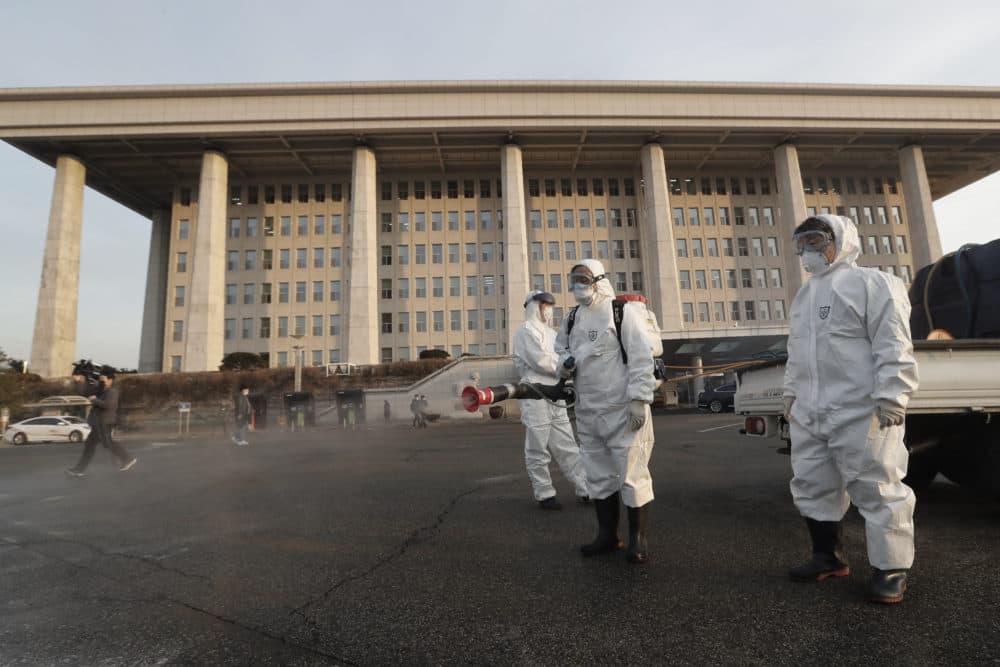Advertisement
Commentary
The U.S. Is Well Suited To Fight Coronavirus, But Only If We Fund Science

The Trump administration notified Congress earlier this month that it would divert $3.8 billion from Pentagon funding to build the long promised wall on our southern border. But as the administration rummages around for federal funding for this physical wall, it is dismantling a far more important wall of defense that has been created over decades: America’s global health infrastructure.
In this year’s budget proposal, the Trump administration sought a 10% funding cut to the Department of Health and Human Services (DHHS), a 9% cut to the Centers for Disease Control and Prevention (CDC) and a 7% cut to the National Institutes of Health (NIH). These institutions are foundational to America’s contribution to global health. Not only will these cuts threaten the lives of millions of people across the world, they also jeopardize the health of Americans, America’s economic growth and our standing as a world leader.
The coronavirus (COVID-19) epidemic has brought a terrible loss of life to China and ignited terror worldwide, but it has also taught us important lessons about our global health infrastructure. While the Chinese public health professionals deserve credit for their excellent and courageous efforts to contain the virus, considerable credit goes to American investments in global health in making a rapid and effective response possible.
The National Institute for Allergy and Infectious Diseases (NIAID), which is part of the NIH, acted quickly to conduct fundamental investigations that helped us rapidly understand the biology of COVID-19. Within weeks of the alarm being sounded, the genetic code of the virus was publicly published and rapid testing for the virus became possible. This was possible due to previous research conducted by NIH-funded investigators on SARS and MERS which are also coronaviruses — viruses that typically result in respiratory infections. (They are readily transmitted from person-to-person, and can sometimes also transmit from other animals to humans.)
The NIH is already funding important clinical trials to understand how best to treat patients infected with COVID-19 and has made funding available for researchers to fast-track research into this virus. During the Ebola virus epidemic, DHHS funded research on an antiviral drug called Remdesivir that is now finding application against COVID-19. The Department is also racing to develop a vaccine against this virus. Cutting funding for global health work only weakens the fortifications between Americans and life-threatening epidemics.
Cutting funding for global health work only weakens the fortifications between Americans and life-threatening epidemics.
If saving American lives isn’t sufficient motivation, preserving the economic health of the United States should be. The virus has hobbled the world’s second-largest economy, as millions of Chinese have been held under quarantine by the virus. The global economy, the U.S. included, is imperiled. Just yesterday, the S&P 500 dropped 3%, on news of COVID-19 outbreaks in Italy and South Korea.
American companies like Apple, that are dependent upon parts manufactured in China, have already seen a downturn in their stocks and lowered their revenue expectations. Large chains such as Starbucks and McDonalds had to shutter their shops for weeks due to the epidemic. By some estimates, the COVID-19 epidemic could cost the global economy $1.1 trillion.
Mitigating the economic loss from the epidemic requires a rapid containment of the virus, understanding how to treat it and developing vaccines to prevent future recurrences. This is where a strong American investment in global health could safeguard its economic interests.
If saving American lives isn’t sufficient motivation, preserving the economic health of the United States should be.
Finally, the Trump administration should consider the geopolitical impact of its retreat from global health initiatives. Investment in global health is a key component of American diplomacy, which gives legitimacy to its claim of moral leadership worldwide and furthers its foreign policy interests. Consider the President’s Emergency Plan for AIDS Relief (PEPFAR) launched by President George W. Bush. It has not only had a major impact on the global HIV/AIDS epidemic, it has also improved the perception of the United States, fostered the stability of frail governments and furthered American diplomatic goals in recipient countries.
Some may argue that the U.S. — by far the largest global health contributor already — cannot afford to invest any more money into global causes. Reality check: in 2019, Congress approved $11 billion in global health aid, which equals roughly 0.25% of the 2019 federal budget. If the U.S. chooses to shrink its decades-long role, other ascendant countries will surely fill the vacuum. Notably, China already has considerable investments in several African countries.
To borrow from Kofi Anan, epidemics like COVID-19 are “problems without passports.” Tall walls and immigration officials will not keep them out, but international collaboration, smart investments in research and compassion just might.
